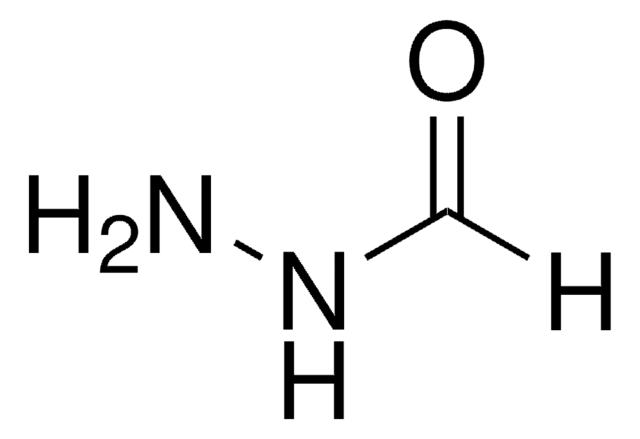803480
PDPH (3-(2-pyridyldithio)propionyl hydrazide)
Synonyme(s) :
3-(2-Pyridyldithio)propionate hydrazide, 3-[(2-Pyridyl)dithio]propionohydrazide
About This Item
Produits recommandés
Pureté
≥95%
Niveau de qualité
Forme
powder
Poids mol.
229.32
Pertinence de la réaction
reagent type: cross-linking reagent
Conditions de stockage
desiccated
Solubilité
DMSO or DMF: soluble
Groupe fonctionnel
hydrazide
Conditions d'expédition
ambient
Température de stockage
2-8°C
Chaîne SMILES
NNC(CCSSC1=NC=CC=C1)=O
InChI
1S/C8H11N3OS2/c9-11-7(12)4-6-13-14-8-3-1-2-5-10-8/h1-3,5H,4,6,9H2,(H,11,12)
Clé InChI
NITXODYAMWZEJY-UHFFFAOYSA-N
Description générale
Caractéristiques et avantages
- Reactive groups: pyridyldisulfide and hydrazide
- Reactive toward: sulfhydryl groups and carbonyl (aldehyde) groups
- Short (9.2A), sulfhydryl-to-aldehyde crosslinker with disulfide bond spacer arm (cleavable)
- Pyridyldithiol group results in attachment to sulfhydryls via disulfide bond, which can be cleaved with DTT, TCEP or other reducing agents
- Hydrazide group conjugates to oxidized sugars of glycoproteins and carbohydrates
- Use sodium meta-periodate to oxidize glycosylation (e.g., sialic acid) to reactive aldehyde groups
- Use with EDC to conjugate primary amine of hydrazide group to carboxyl groups
Attention
Code de la classe de stockage
11 - Combustible Solids
Classe de danger pour l'eau (WGK)
WGK 3
Point d'éclair (°F)
Not applicable
Point d'éclair (°C)
Not applicable
Faites votre choix parmi les versions les plus récentes :
Certificats d'analyse (COA)
Vous ne trouvez pas la bonne version ?
Si vous avez besoin d'une version particulière, vous pouvez rechercher un certificat spécifique par le numéro de lot.
Déjà en possession de ce produit ?
Retrouvez la documentation relative aux produits que vous avez récemment achetés dans la Bibliothèque de documents.
Notre équipe de scientifiques dispose d'une expérience dans tous les secteurs de la recherche, notamment en sciences de la vie, science des matériaux, synthèse chimique, chromatographie, analyse et dans de nombreux autres domaines..
Contacter notre Service technique
![LC-SPDP (succinimidyl 6-[3(2-pyridyldithio)propionamido]hexanoate)](/deepweb/assets/sigmaaldrich/product/structures/300/586/d95fd80c-e201-4b0b-8aee-31e109c2ff41/640/d95fd80c-e201-4b0b-8aee-31e109c2ff41.png)





![Sulfo-LC-SPDP (sulfosuccinimidyl 6-[3′-(2-pyridyldithio)propionamido]hexanoate)](/deepweb/assets/sigmaaldrich/product/structures/266/633/e2a263be-4bd3-4fcf-89c4-75b5e2bd829c/640/e2a263be-4bd3-4fcf-89c4-75b5e2bd829c.png)

